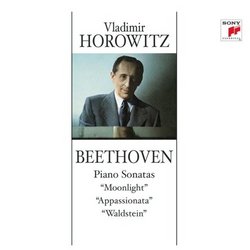| All Artists: Ludwig van Beethoven, Vladimir Horowitz Title: Beethoven: Great Piano Sonatas Members Wishing: 0 Total Copies: 0 Label: Sony Release Date: 9/30/2003 Album Type: Limited Edition Genre: Classical Styles: Chamber Music, Forms & Genres, Sonatas, Historical Periods, Classical (c.1770-1830), Modern, 20th, & 21st Century, Romantic (c.1820-1910) Number of Discs: 1 SwapaCD Credits: 1 UPC: 827969043226 |
Search - Ludwig van Beethoven, Vladimir Horowitz :: Beethoven: Great Piano Sonatas
 | Ludwig van Beethoven, Vladimir Horowitz Beethoven: Great Piano Sonatas Genre: Classical
|
Larger Image |
CD Details |
CD ReviewsClose, but no Cigar Hank Drake | Cleveland, OH United States | 01/28/2007 (4 out of 5 stars) "This CD features the legendary pianist in three popular Beethoven sonatas. It's no secret that Horowitz did not care for Beethoven's clumsy piano writing, was not regarded as a great Beethoven interpreter, and recorded these sonatas merely to satisfy contractual obligations. Though these sonatas were recorded in 1972 and 1973, Horowitz never played these particular works in public after 1953. Record company executives were the bane of Horowitz's existence until very late in his career, when he had attained so much notoriety that he could "record the C major scale and it would sell" in the words of Thomas Frost.
This is Horowitz's third recording of the de-rigeur Moonlight. As a performance, it is smoothed out and uneventful, slick and modern--even cold. The triplets of the opening movement lope along without having much meaning invested in them (a far cry from Horowitz's 1956 recording of the work which, despite its poor sonics, remains a benchmark in Beethoven performances). The Allegretto has some nice voicing, but the Finale's sudden accents are ignored, robbing the movement of much of its drama. One can admire the clarity of the playing here, as well as the technical finesse and excellent recorded sound, but Horowitz's heart is clearly not in this performance. Horowitz's recording of the Waldstein Sonata in C major, Op.53, alternately delights and distracts. The clarity of the outer movements is remarkable, as is the unique kinetic energy. But, his feminine way of phrasing the first movement's second theme, beautifully voiced as it is, is especially foreign to Beethoven's masculine approach. The trills which accompany the main theme in the last movement are uncannily balanced, but purists will also be annoyed by Horowitz's rewriting of the finale's coda: where Beethoven has written octave glissandi, Horowitz substitutes octaves played presto and staccato. It has been speculated elsewhere that Horowitz considered the octave glissandi unplayable on the modern piano. Nonsense, I've played it as written myself, and so have many fellow pianists. Horowitz simply did not like the way Beethoven's writing sounded, so he changed it. Still, it cannot be said that this performances are boring (he's way ahead of Rubinstein's 1954 performance, which drags in the finale), and in today's homogenized pianistic culture, that alone is adequate recommendation. Horowitz was more attuned to the bravura Sonata in F minor, Op. 57, the popular Appassionata. This 1972 recording is more successful than his more somber 1959 version. Horowitz allows more of his inate theatricality to come through, thereby increasing the drama of the piece. He also resists the temptation to stress the odd phrase for effect, at the expense of the whole, thereby increasing the structural cohesiveness. Especially noteworthy is the finale, taken at an unhurried tempo (it's actually easier to rush this movement), with virtually no pedal, but with overwhelming effect. Truly a triumph of the will over the limits of the flesh. Sony has adequately remastered the sound, which is more full bodied than before, but remains rather dry. " |

 Track Listings (9) - Disc #1
Track Listings (9) - Disc #1